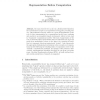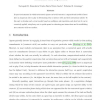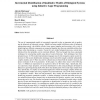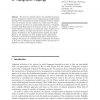127
click to vote
BIOINFORMATICS
2012
13 years 4 months ago
2012
Summary: The MolClass toolkit and data portal generates computational models from user-defined small molecule datasets based on structural features identified in hit and non-hit m...
131
click to vote
CSFW
2011
IEEE
14 years 1 months ago
2011
IEEE
—We propose a much-needed formal definition of security for cryptographic key management APIs. The advantages of our definition are that it is general, intuitive, and applicabl...
107
click to vote
IAT
2010
IEEE
15 years 19 hour ago
2010
IEEE
-- In this paper it is explored whether personalisation of an existing computational model of attention can increase the model's validity. Computational models of attention ar...
107
click to vote
ACL
2010
15 years 2 days ago
2010
This paper presents ongoing research on computational models for non-cooperative dialogue. We start by analysing different levels of cooperation in conversation. Then, inspired by...
135
click to vote
NC
2010
15 years 14 days ago
2010
My main objective is to point out a fundamental weakness in the conventional conception of computation and suggest a promising way out. This weakness is directly related to a gross...
122
click to vote
AAI
2004
15 years 1 months ago
2004
In open environments in which autonomous agents can break contracts, computational models of trust have an important role to play in determining who to interact with and how inter...
138
click to vote
JETAI
2007
15 years 1 months ago
2007
Research in computational cognitive modeling investigates the nature of cognition through developing process-based understanding by specifying computational models of mechanisms (...
141
click to vote
JMLR
2008
15 years 2 months ago
2008
The use of computational models is increasingly expected to play an important role in predicting the behaviour of biological systems. Models are being sought at different scales o...
139
click to vote
ALIFE
2006
15 years 2 months ago
2006
We show how cultural selection for learnability during the process of linguistic evolution can be visualized using a simple iterated learning model. Computational models of linguis...
110
click to vote
COGSCI
2010
15 years 2 months ago
2010
Computational models of meaning trained on naturally occurring text successfully model human performance on tasks involving simple similarity measures, but they characterize meani...




